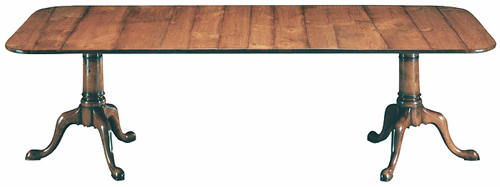
Great Britain’s Furniture Guilds have no equivalent in the United States. Created by the Statute of Apprentices in 1563 and continuing to this day, they are training grounds where skills are passed on, ensuring that age-old techniques are revered and not lost.
To achieve the level of Master Craftsmen, Guilds require 7 years of dedicated learning – first as journeymen, then as apprentices. This quality training is mirrored in the work that they do – including the selection of timber. Fine, straight-grain is a criterion of mass-produced pieces (easier to match), but rarity and singularity are characteristics of state-of-the-art furnishings – like those crafted for Elijah Slocum. In fact, really exemplary and unique timber is put aside specifically for high visibility show pieces like a dining table, for example.
Which brings us to pearls. Oops! We mean burls. Well, actually, they have a similar quality. Pearls are created around errant grains of sand. Burls, those twisted, contorted knobs often seen on the sides of trees, are created by the tree’s cells fighting back against (and around) a bacterium. The result is a convoluted, irregular grain that looks like lots of knots on a wooded surface. Both are rare.
It takes an exceptional craftsman to work with an exotic timber like burl. But it takes only a casual glance at the finished dining table to know that it is extremely unusual and beautifully made. This is bespoke furniture, something Elijah Slocum is known for.
Time to start planning for the holidays.
Recent work shown above:
Date/Circa: 21st century using 19th century craftsmanship
Size: 102″ long
Catalogue no: F7201
Custom-made 102″ Sideboard in Rare Burl Walnut
Made to Client’s Specification
Close up of Dining Table’s French Walnut Burl Planked Top
Custom-made Chest of Burr Oak



